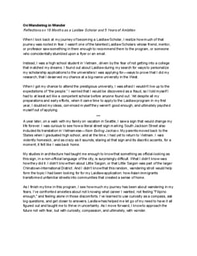On Poverty and Privilege - LiA Reflection Week #6
Before heading back to North America, I had the chance to visit the city I grew up in: Ho Chi Minh City, Vietnam. Ask any of my friends, and they’ll vouch for how much I adore the place; how much of my identity—my love for architecture, my interest in cultural studies, and my understanding of myself—was born in the city. As I’d sometimes say before this summer, “Vietnam was my beginning.”
Only, I am not Vietnamese, nor are my parents. We moved into the country when I was five for my dad’s job, and with the move came a few expat benefits, most notably tuition contributions to an international school. I’d like to say that I never took that for granted. When I interrogate my personal narrative, I recognize that much of my being here as a Pearson and Laidlaw scholar is grounded in taking advantage of the opportunities I was lucky enough to have—that I put in the work to deserve the full-ride I spent years striving for.
However, visiting the city again after my five weeks in Payatas put into perspective the privileges I knew I had but had never fully understood. In Payatas, the public education system is underresourced and underfunded. Classes often average over fifty students, some divided only by walls of whiteboards. Even then, schools must split grade levels into two shifts: one from 6 am to 12 pm, and another from 12 pm to 6 pm.
When I walked the halls of the school where I spent all my pre-college years, I tried to imagine what those numbers really meant. What would it have been like to sit in a classroom twice the size of my middle school classes, or four times the size of my sixth form ones? How much access would I have had to my teachers? How personal, how precise could their feedback be?
It was especially difficult to reflect on this while thinking about the students I met through Fairplay. They worked harder, showed more discipline, integrity, and curiosity than I did at their age. They laughed, played, and felt joy. Why would they be any less deserving of a world-class education?
So when I think about what I once took for granted, I think about the teachers who taught me to dream, to be ambitious. I think about how I graduated in a class where attending a world-renowned university was the norm rather than the exception. And I think about how, as my friends at Fairplay reminded me, Vietnam was not truly my beginning. I was born into an upper-middle-class Filipino family that was given access to an even better education and opportunities than naturally available, and that privilege turned my dreams into something I could more easily pursue.
What I now grapple with is my earlier belief that I got here purely because “I put in the work.” That way of thinking sees merit only in individual effort, without accounting for the very different contexts in which people do their best. In Payatas, I met students whose discipline, integrity, and curiosity exceeded my own, but whose circumstances will make their paths far more difficult. “Doing the best” looks different depending on whether you have structural support or structural barriers.
My time in Payatas, alongside my return to Ho Chi Minh City, has reminded me that privilege without purpose is empty. If I climb a career ladder without questioning who gets left behind, then I fail to honour the opportunities I was lucky to receive. So as I move forward, I carry with me a deeper commitment: to fight for equity and inclusion in the spaces I enter, to make room for those whose hard work is too often overlooked, and to remember that qualifications alone never tell the full story of someone’s potential.

Please sign in
If you are a registered user on Laidlaw Scholars Network, please sign in